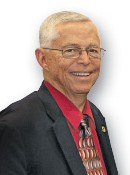Communicate about the need for seasonal turf maintenance programs
 There was an interesting comment online recently about how some folks refer to our most invasive cultural practices as “evils” because they mark up the playing surface for a week or two, often less. Golfers hate to see those big aerifiers, verticutters and topdressers roll out in late summer when the turf is most active and recovery happens sooner.
There was an interesting comment online recently about how some folks refer to our most invasive cultural practices as “evils” because they mark up the playing surface for a week or two, often less. Golfers hate to see those big aerifiers, verticutters and topdressers roll out in late summer when the turf is most active and recovery happens sooner.
A superintendent eloquently explained that it wasn’t an “evil,” it was preventative medicine, like getting an annual physical or dental exam to keep you functioning properly, and that folks need to change that negative mindset into a positive outlook. I think more state chapters across the country need to dedicate themselves to ongoing seasonal government relations programs to ward off the negative consequences of our perceived “evil” practices.
If I’ve learned one thing over my years of association work, it’s that naysayers and environmental extremists are well known by our legislators. They make it a point to carp and complain about agriculture and green industry practices all the time and are frequent visitors of city, county, state and federal lawmakers. Their advocacy is year around, not just annual.
A lot of these folks have nothing else to do except join a cause, while superintendents have a pretty demanding job day in and day out. However, we can and must do better. I give kudos to GCSAA for the recent hiring of Robert Helland to be that 24-7 guy at the national level. Chava McKeel, GCSAA director of government relations, has been blazing inroads in D.C. for superintendents for years, and she’s widely respected, professional and organized. Having Helland on full time can only strengthen the government relations team on the national level.
However, the old saying that “all politics is local” means that state and local chapters also need to ramp up their game. Annual visits to state capitals are great, but we need to be more forcefully present locally to balance the information legislators are getting. We need meaningful laws that don’t penalize green industry businesses, which contribute more than lawmakers may realize to local economies and environmental quality.
Reaching out to allied green industries like agriculture grower associations, landscape, nursery and sports turf associations can be most helpful in lobbying and educating legislators at all levels of government. Most of these organizations already have established working relationships with lobbyists or have direct contact with lawmakers. When attending annual meetings and government sessions at all levels it’s interesting to introduce myself as being with the Florida Golf Course Superintendents Association, and to watch the reaction of the politician. So many of them don’t get that we’re part of a business that makes huge contributions to the economy at all levels. I like to tell them that golf is essentially “urban agriculture,” especially when water quality and conservation issues are at stake.
The biggest disappointment for me in the whole government relations arena is the absence of the golfers themselves when it comes to speaking out about the positives of golf course green spaces and the wildlife they see on the course. Instead, the vocal golfers mostly seem to be like the course condition complainers I mentioned earlier.
Do the best job you can of communications and “show-and-tell” about the need for seasonal turf maintenance programs. The growth of superintendent blogs have resulted in several comments concerning club members who have called out the complainers and supported the superintendent.
Communications at all levels of golf and government operations is a never-ending job — a necessary evil — just like aerifying, verticutting and topdressing!








